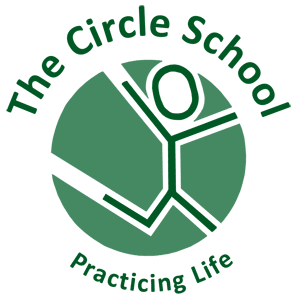In conversations about schools and educational methods, we hear a variety of terms. Following is a list of some of the terms we hear, and a rough sketch of our relationship with that term. We identify strongly with some of these, others only a little.
Democratic school. The Circle School is a democratic school, managed by students and faculty together. Democratic schooling emphasizes collective self-governance, tending to follow a one-person-one-vote structure, but can have other widely varying program features. The Circle School can be viewed as a constitutional republic, balancing majority rule with protection of individual rights such as freedom of speech, assembly, and self-determination.
Self-directed school. At The Circle School students direct their day and their lives, choosing for themselves, growing into independence embedded in community and a scaled-down version of the larger world. Self-directed education cultivates critical thinking, individual talents, initiative, and self-motivation, while avoiding the repression of interests, hopes, aspirations, and other self-awareness that tend to wither in a forced curriculum.
Integral school. Drawing on Integral Theory, integral schools trust in an inborn impulse to self-actualize, support kids’ spiral development of a personal worldview, foster growth along multiple lines of development, and immerse children in the joys and burdens of community. Sound interesting? Check out our Introduction to Integral Education!
Independent school or unaffiliated. The Circle School is an independent school because it is operated and funded individually rather than by the government or other central organization.
Sudbury model or Summerhill model school. The Circle School’s program represents an evolution of A.S. Neill’s Summerhill School, and the student experience is similar to that of Sudbury Valley School, Fairhaven School, and Alpine Valley School. While Sudbury model schools match Sudbury Valley School in various ways, The Circle School differs in governance, philosophy, and theory of education.
Alternative school. The Circle School can be considered an alternative school in that it operates a non-traditional program. However, “alternative” has also increasingly come to refer to schools being operated expressly for the accommodation of students whose special academic or behavioral needs are not being met in the local public school — a description which does not apply to The Circle School. With or without particular gifts or needs, The Circle School welcomes all who can thrive here.
Free school. The Circle School is not a free school, although it shares with free schools a belief in the importance of the rights of the individual. Free schools, which gained popularity in the 1960s and ’70s, often have philosophical roots in anti-authoritarianism and anarchy, and may focus on these themes. In contrast, The Circle School’s emphasis is more on empowering individuals to thrive engaged in society and embedded in community. Occasionally the term “free school” is applied to schools charging no tuition. The Circle School is not a free school in this sense either, although we do offer significant financial aid to most families.
An integral self-directed democratic independent school . How we’d refer to ourselves, if it weren’t such a mouthful!
